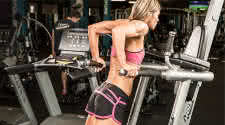Negative Exercise & Training Methods - Does Eccentric Training Add Mass?

Proper Training Techniques are Extremely Valuable for Success
You'd be hard-pressed to find a bodybuilder who claims negatives aren't important. Focusing on a clean and controlled negative or
eccentric contraction - the down phase of a lift - may he one of the most important aspects of training. In fact, research recently
demonstrated that subjects who trained quads exclusively with maximal eccentric training increased their eccentric torque (rotary
force about a joint) by 116% and their concentric or positive torque by 5%. Conversely, those who trained exclusively with maximal
concentric contractions improved their concentric torque by 53% and their eccentric torque by 10%.
Seems like a slam dunk: Negatives kick butt. But researchers examined the two types of contractions independently, which doesn't
accurately reflect how we really train. How many of you iron freaks go to the gym and tell your training partner, "Hey, let's train
wheels today but just with negatives"?
A natural progression would be to look at the way a person actually trains to determine how effective negatives are. But when you
have some serious training scheduled, where you do many negatives in a set, where you'd add even more weight to the bar than what
you can do on a positive and control it as much as possible, wouldn't it he cool to know that you'll do more than just tear up your
muscles to the degree that you'd have to call Mom in to brush your teeth for you the next morning?
THE TEST
I'm unsure whether Michael Godard and colleagues from the department of health, physical education and human performance studies at Adelphi University in Garden City, New York, had Mom's best interests at heart, but they certainly wanted to know whether negatives with 40% more weight than a max would positively affect one's training. They divided 28 physically active men and women who weren't pumping iron at the time of the study into three groups: regular concentric/eccentric training, concentric and eccentric plus 40% of their one-rep max training and a control group.Each subject did one set of 8-12 reps twice a week for 10 weeks on a Cybex 6000 leg-extension machine. The intensity of work was initially set at 80% of one-rep concentric max and the apparatus allowed for controlled speed of movement (30 degrees per second). The set was terminated when a subject couldn't complete a full rep or when the speed of movement couldn't he maintained. When a subject was able to complete 12 reps, the resistance was increased by 5%.
THE EFFECT
Want it short and sweet? Adding 40% to their max and doing negatives didn't result in significant changes in the subjects either moving more weight concentrically growing bigger quads or changing body mass when compared to doing standard reps. But check this out: The regular training group and the 40%-plus group increased their strength by 101% and 106%, respectively which is quite a bit more than what most other studies have found, The scientists concluded that the high- intensity/low-volume training may have been intense enough to stimulate growth yet still allowed for sufficient recovery.Back to the negatives. Once all the data had been collected and the researcher's had a chance to consider what might have caused the results that seem to contradict what most bodybuilders will tell you, they formed this logical explanation: Since both groups trained to concentric failure, adding more weight to a negative wouldn't have an effect because the muscle was already taken to the limit. In other words, you can't get more mileage out of a car with an empty gas tank, no matter what you do (short of tanking up, of course).
Even though this makes sense, you might not be convinced by one study that loading up on negatives may not be as productive as you think. Consider, then, that the same results were found in another study with a slightly different research design.